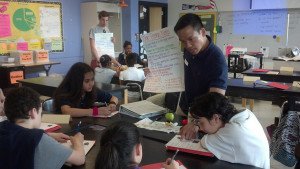Citizen Teachers Build Skills While Teaching Skills
Dr. David Jones is a professor of management in the School of Business at the University of Vermont. My first exposure to Citizen Schools was in Spring 2012 when I agreed to conduct an independent assessment of how serving as a volunteer Citizen Teacher might affect employee volunteers in ways that benefit both them and their employer. Through my work with Citizen Schools, I’ve seen first-hand the dramatic impact that Citizen Teachers can have on young minds, exposing middle school students across the country to new experiences and opportunities in a variety of careers.
But as a professor of management in the School of Business at the University of Vermont, what I am really fascinated by is research findings showing that many employees respond positively when their employer provides opportunities to serve their communities, so I’ve been conducting studies to understand why. For instance, what is it about employee volunteerism that seems to foster employee commitment and loyalty? Why is it that employee volunteers often return to work and engage in more cooperative behaviors to help their coworkers and employer?
I’m intrigued by whether employee volunteers can develop and hone their work-related skills through volunteering. Many employee volunteers believe they improve their skills, as do many corporate leaders. But, as the saying goes, talk is cheap. To date, this skill development hypothesis had not yet been rigorously tested. The apprenticeship experience of Citizen Schools’ volunteers seemed like a perfect context to test this question because it provides employees with a novel context in which they can safely practice and develop their skills in leadership, teamwork, public speaking, and so on. With the help of Citizen Schools and four of their longtime corporate partners - Google, Cisco, Cognizant, and Fidelity, I set out to test this hypothesis. What I found was remarkable:
About 50 percent of Citizen Teachers saw noticeable improvements in their overall work-related skills including public speaking and presentation abilities.
As one teacher admitted, “The experience challenged my communication skills in ways I am not challenged at work. I had to adapt to a different audience and try to get my points across.”
About 45 percent of participating Citizen Teachers noticed improvements in mentoring, leadership and project management skills.
About one third to half of employees reported improvements in time management, speaking clearly, communicating performance expectations, providing performance feedback, and teamwork skills.
Importantly, evidence from the study pointed to the apprenticeship experience as the reason for these apparent improvements. For instance, Citizen Teachers who spent more time using specific skills during the course of their apprenticeship reported greater improvements in those very same skills.
And that’s just the beginning. For example, these same Citizen Teachers (92 percent) affirmed that they felt proud of their employer’s support for Citizen Schools, and this pride was associated with enhanced levels of job satisfaction, trust in their employer, desire to contribute to the company’s well-being, intentions to remain employed, and cooperative work behaviors. These findings (as covered in George Bradt's recent piece on Forbes.com) show that the experience can benefit both the employee volunteers (e.g., having enhanced moods at work) and the employers who support them (e.g., through responses linked to employee retention).
What does this mean?
Essentially, skill-based volunteering can help to not only equip employee volunteers with the abilities they need to excel professionally, but also gives them a much-needed personal and positive connection to their employer. In essence, Citizen Schools apprenticeships give back as much to the Citizen Teachers and their companies as they do to the students they teach.
To review a report of the full study results, click here. Learn how to get your company involved.


